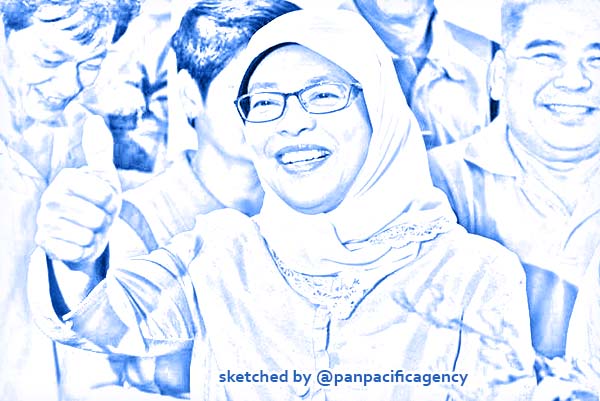Asian economies should tap women as powerful, underutilised engine of growth: Singapore’s president

Singapore President Halimah Yacob is visiting the Philippines upon the invitation of President Duterte. AFP. Sketched by the Pan Pacific Agency.
SINGAPORE, Nov 19, 2020, ST. The time that women in Asia-Pacific spend on housework daily could count for at least US$10.8 trillion (S$14.5 trillion) of the global economy annually, making them a powerful engine of growth that economies should tap in their post-pandemic recovery, said President Halimah Yacob, The Straits Times reported.
In her speech on Thursday (Nov 19) at the virtual Women’s Forum Global Meeting 2020, Madam Halimah said: “Asian economies are sitting on a powerful and underutilised engine of growth. Advancing gender equality in Asia-Pacific could mean an extra US$4.5 trillion or 12 per cent of the collective annual GDP. In the same vein, this could also bring in an additional S$26 billion to Singapore’s annual GDP over the next 10 years.
“Promoting women empowerment is therefore not just an ideal of fairness, but also one that makes economic sense.”
Madam Halimah said: “In Asia-Pacific, women spend four to 11 times more time on housework than men do daily. According to the UN Women Asia and the Pacific, such work could count for at least US$10.8 trillion a year of the global economy. However, the effort spent on this work is often unrecognised and undervalued.”
In her opening speech at a plenary session titled “Governing the she-covery: designing a better post-pandemic economy”, Madam Halimah highlighted three areas which Singapore is focusing on for its economic recovery, and the critical role women can play in the process.
First, Singapore plans to accelerate its economic transformation and step up the use of digitalisation, automation and artificial intelligence.
“In order to reap the full rewards of technological advancement, we must continue to strengthen women’s participation in leadership, and in the implementation of such strategies,” said Madam Halimah.
She added that society has to move away from the traditional mindset that females do not prefer science, technology, engineering and mathematics subjects in schools and do not performwell in related jobs.
“We should ensure that women can benefit from these same opportunities and technological tools,” she said.
Second, Singapore aims to help those working in ailing industries transition to other industries by upgrading and acquiring new skills.
“By encouraging our workers to reskill and upskill, our companies can continue to stay relevant and competitive. And in so doing, it also offers us an opportunity to level the playing field between men and women in the workplace,” said Madam Halimah.
Third, Singapore has to strengthen its partnerships and diversity, such as by having more cooperation between the private and public sectors and across different talent pools.
“We must continue to embrace diversity in women’s leadership and highlight women’s voices and perspectives,” she said.
“In this regard, the recently launched Conversations on Singapore Women’s Development is an important platform to spearhead an inclusive approach towards co-creating and co-implementing solutions on issues affecting women in Singapore,” she added.
The conversations, announced in September, are gathering feedback on issues that affect women at home, in school, the workplace and in the community.
The ideas and suggestions from these discussions will form the basis of a White Paper to be delivered in the first half of next year.
The Women’s Forum Global Meeting 2020, which took place on Wednesday and Thursday, consisted of plenary sessions, dialogues and roundtable meetings.
Participants discussed how female leaders can play an essential role in social and economic recovery, while empowering and fostering long-term resilience amongst the vulnerable groups of people and the society at large.
Singapore hosted the Women’s Forum Singapore in 2018 and the Women’s Forum Asia last year.